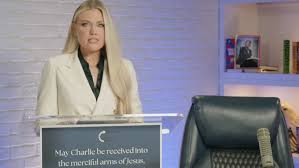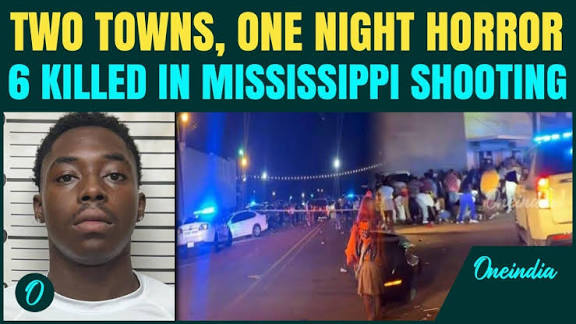Inside Erika Kirk’s First Public Speech: Mourning, Faith & Fighting On

Erica Kirk had vowed to fight against ‘Evil-Dorce’ in her first statement since her husband was shot. Today we will discuss about Inside Erika Kirk’s First Public Speech: Mourning, Faith & Fighting On
Inside Erika Kirk’s First Public Speech: Mourning, Faith & Fighting On
Grief has its own voice. It trembles between heartbreak and resolve, between loss and the spark of purpose. On September 12, 2025, in her first public address since the tragic assassination of her husband, conservative activist Charlie Kirk, Erika Kirk struck that delicate balance. What unfolded was not only a portrait of mourning, but a declaration of faith and determination to carry on. This speech reveals something essential—not just about Erika Kirk as a widow, but about the potency of belief, legacy, and the decision to fight on.
1. Setting the Stage: What Happened Before

To understand the weight of Erika Kirk’s words, it’s important to briefly outline what preceded them. Charlie Kirk, co-founder of Turning Point USA, was shot and killed on September 10, 2025, while speaking at Utah Valley University during the inaugural event of the organization’s “American Comeback Tour.”
The shock of the event reverberated across media, political circles, and the communities he had built with, especially among students and younger activists.
Just two days later, Erika Kirk stepped forward to speak publicly for the first time. She did so not simply to mourn, but to frame the narrative moving forward: what loss means, how faith endures, and how the mission her husband championed will persist.
2. Mourning: Facing the Pain, Naming the Loss
The grief was raw, immediate, and unmistakable. Erika opened by acknowledging not only the personal devastation—losing a husband and father—but also the wider vacuum left in his movement. She spoke of her children, too young to fully understand, of her daughter asking, “Where’s daddy?” and her own response: “He is on a work trip with Jesus.”
This moment—explaining to a toddler—is more than anecdote; it’s emotionally symbolic. It reveals how grief isn’t contained in public mourning, but in small daily ruptures: bedtime routines without his voice, daily chores, conversations never had. By sharing that moment, Erika allowed listeners to sense the intimacy of her loss.
But she did not allow grief to be paralyzing. The speech moved from brokenness to resolve. Mourning was plainly stated—but so was the refusal to be silenced. “The movement my husband built will not die,” she said. “No one will ever forget my husband’s name, and I will make sure of it.”
3. Faith as Anchor and Furnace
A central thread in Erika’s speech was faith—not optional, but foundational. Christianity, for her, was both comfort and compass. She repeated images of heaven, martyrdom, spiritual warfare, and God’s love. In her tribute, Charlie Kirk was “received into the merciful arms of Jesus.”
Her faith was also the means by which she reframed the tragedy. Rather than seeing the shooting as simply an act of senseless violence, she positioned it as spiritual: Charlie died because of his preaching—his message of “patriotism, faith and God’s merciful love.”
She gave meaning to death by holding fast to beliefs about eternal life, martyrdom, and spiritual legacy.
Moreover, faith served as an “ignition”—a furnace that refines. In speaking of her pain, she also spoke of the fire it has lit within her: “The cries of this widow will echo around the world like a battle cry.” That line captures a transformation: mourning becomes fuel for mission.
4. Fighting On: Legacy, Mission, and Movement
Erika Kirk did not just honor her husband; she vowed to extend his work. She promised the continuation of Turning Point USA’s scheduled events: the fall campus tour, the AmericaFest gathering, the podcast and radio show.
But more than scheduling, there was insistence on scale and intensity: stronger, bolder, louder, greater than ever. “We’ll never surrender.” She addressed those who hoped the violence would silence them—declaring that not only would it not silence her husband’s movement, it would amplify it.
Her charge to young people—students in high school or college—to become actively involved in Turning Point USA chapters signals that this isn’t about remembrance only. It’s about recruitment, activism, institutional continuity. The speech intentionally shifts from loss to duty. That shift is essential to its power.
5. Rhetorical and Emotional Strategies
What makes a speech especially resonant? Erika’s address used several rhetorical and emotional strategies, worth noting:
Personalization: She speaks of her children, her relationship with Charlie, their hopes—making the message human. Everyone listening is drawn into someone’s personal grief and hope.
Imagery and metaphor: The “crown of martyr,” “battle cry,” “fire ignited,” “work trip with Jesus” — these vivid images evoke both spiritual and emotional weight.
Acknowledgments and gratitude: She thanks first responders, law enforcement, the president, vice president, and others who have shown support. Gratitude roots the speech in humility and community.
Defiance merged with hope: Rather than giving in to despair, her words are defiant—“the movement will not die,” “no one will ever forget.” But this defiance is grounded in hope: hope through her faith, hope through communal action.
Tone shifts: From sadness to resolve, from tenderness to exhortation. That shift holds attention and moves the audience emotionally.
6. Themes & Implications
From her speech, several themes emerge; they have implications for both her personal journey and broader social/political contexts.
a) Mourning as public and private
Erika’s grief is deeply personal but she makes it public—not for spectacle, but for witness. Her mourning is also a call to others: to share in remembrance, to affirm what was lost, and thus to affirm what mattered.
b) Legacy beyond life
She frames Charlie’s life as something that goes beyond his death. Legacy—or what one leaves behind—becomes a living thing. It’s embodied in causes, institutions, followers, and belief. She makes it clear: legacy is not nostalgia, but a present charge.
c) Faith as both solace and motivator
Her faith doesn’t erase agony; it gives shape to it. It constructs a meaning—martyrdom, spiritual victory, ongoing spiritual war. For those who share her beliefs, this scaffolding provides strength. For others, it raises questions about the role of faith in public grief and political struggle.
d) Mobilization in tragedy
Erika’s speech is an invitation to action: continue the campus tour, carry forward the mission, expand the reach. Tragedy becomes a pivot point for activism rather than a full stop. This is a powerful narrative in many political and social movements, past and present.
7. Criticisms, Challenges, and Unanswered Questions
No speech, no matter how stirring, is without tension or potential critique. Some of these are already being discussed in media, and others may unfold in time.
Framing of violence: By defining her husband’s death as tied to his political message, Erika casts it in moral and spiritual terms. Some may agree; others may see risk in polarizing an act of violence.
Risk of escalation: Describing the suppression as not just physical but spiritual, invoking words like “evildoers,” “battle cry,” may electrify supporters—but also exacerbate divisions.
Sustainability of the fight: Carrying on the missions—events, speaking tours, youth outreach—requires leadership, organization, finances, safety. Grief affects capacity; expectations may be heavy.
Personal vs. public burden: Erika is a widow with young children. How public expectation intersects with personal healing raises hard questions: how much she will be expected to symbolize versus live privately.
8. Why This Speech Resonates
What makes Erika Kirk’s first public speech stand out isn’t novelty in style but depth: it blends private grief with public mission; it acknowledges vulnerability while asserting strength; it roots political resolve in spiritual soil. In a moment when many would withdraw into silence, she chose to speak not only to mourn but to mobilize.
For supporters of Charlie Kirk and Turning Point USA, it confirms that the movement is more than a person—it is a set of ideas and commitments. For observers, it is a window into how individuals respond to sudden loss in the public sphere: how mourning becomes part of political identity, how faith shapes response, how legacy is defended in words as much as actions.
9. What Comes Next
Erika’s speech sets an agenda. Based on her words, here are possible trajectories:
Continuation of the American Comeback Tour: She has already promised the fall campus tour will go on.
Institutional growth: Turning Point USA events, podcast/radio, AmericaFest—all are likely to become focal points for preserving and extending Charlie’s work.
Youth engagement: High school and college students will be central, both in preserving the movement and building it. Recruiting, organizing, creating new chapters.
Cultural and political symbolism: Charlie Kirk as martyr is now part of the narrative. Symbols matter—his name, image, speeches. Erika is already referencing those symbols.
Personal healing and public burden: How Erika balances her personal life—the mother to young children, private loss—with becoming a figure of public hope and anger, will shape how sustainable this mission is.
10. Lessons & Takeaways
For anyone looking to draw lessons from Erika’s speech (activists, faith leaders, public figures), several stand out:
Authenticity matters: Her words succeed because they are grounded. She doesn’t pretend the pain away; she speaks it, but also leans on what she believes.
Narrative shape: Starting with loss, progressing to purpose, ending with call to action. That shape is strong.
Using symbolic moments: The child’s question, the image of martyrdom, the crown—these anchor emotional response.
Refusing to be silenced, but being mindful of tone: There’s rage, but also hope; anger, but also love. The combination gives emotional depth and moral weight.
Engaging supporters directly: Thanking them, calling them to action, giving them a role. This builds communal momentum.
11. Conclusion: Mourning, Faith, Fighting On
Erika Kirk’s first public speech after Charlie Kirk’s death is a testament to human complexity: deep sorrow intertwined with unwavering resolve, faith that comforts yet also challenges, and a decision to make grief a force rather than a tomb.
In mourning, she reveals both fragility and fierce commitment. In faith, she finds both solace and strategy. In fighting on, she affirms that legacy is not lost with life—it can be renewed with each voice that answers.
For many, Erika’s words will be a moment of sorrow. For others, a rallying cry. Either way, the lines she spoke will echo, not just because of what she lost, but because of what she demands: that the movement, the mission, the belief continue.
How useful was this post?
Click on a star to rate it!
Average rating 0 / 5. Vote count: 0
No votes so far! Be the first to rate this post.
About the Author
usa5911.com
Administrator
Hi, I’m Gurdeep Singh, a professional content writer from India with over 3 years of experience in the field. I specialize in covering U.S. politics, delivering timely and engaging content tailored specifically for an American audience. Along with my dedicated team, we track and report on all the latest political trends, news, and in-depth analysis shaping the United States today. Our goal is to provide clear, factual, and compelling content that keeps readers informed and engaged with the ever-changing political landscape.




